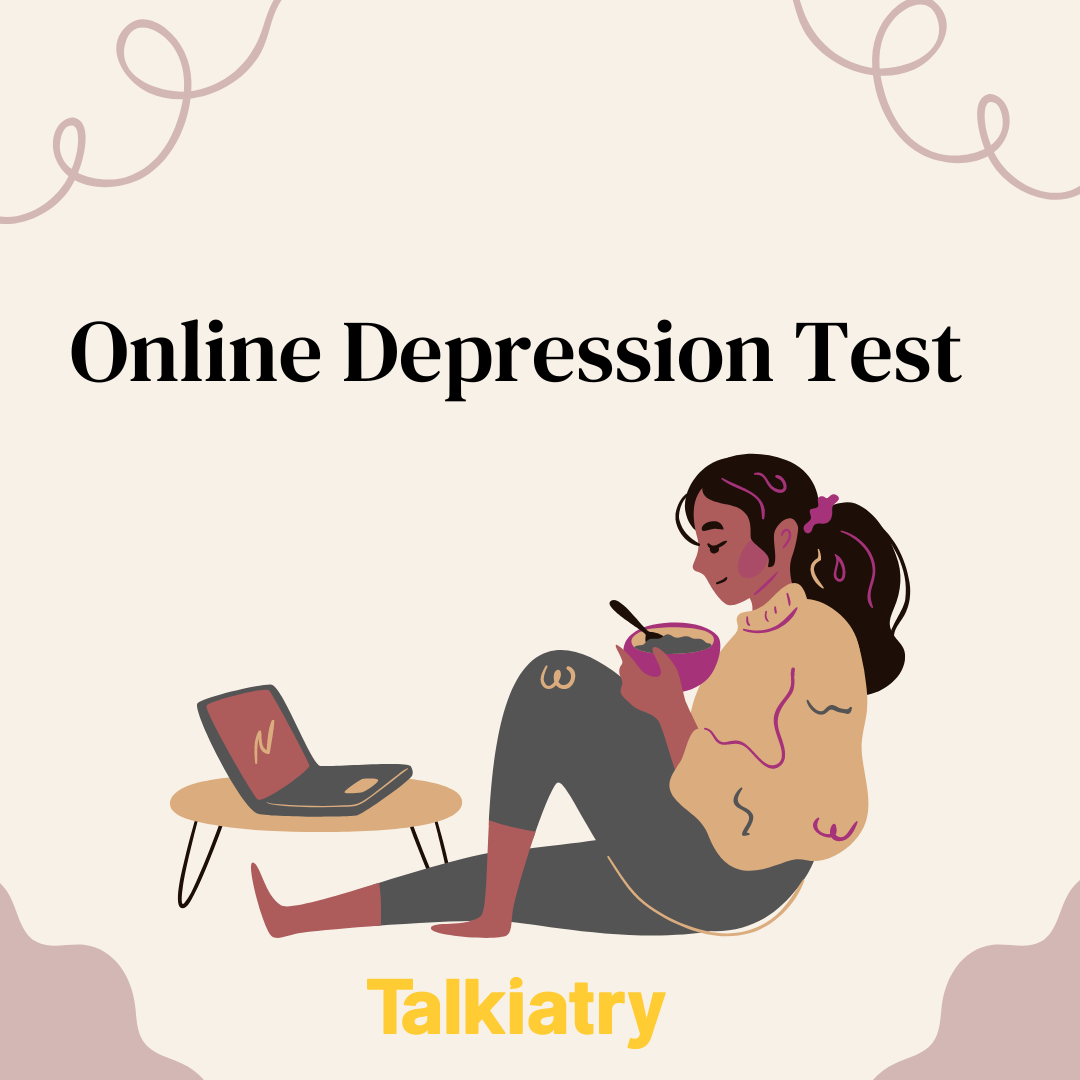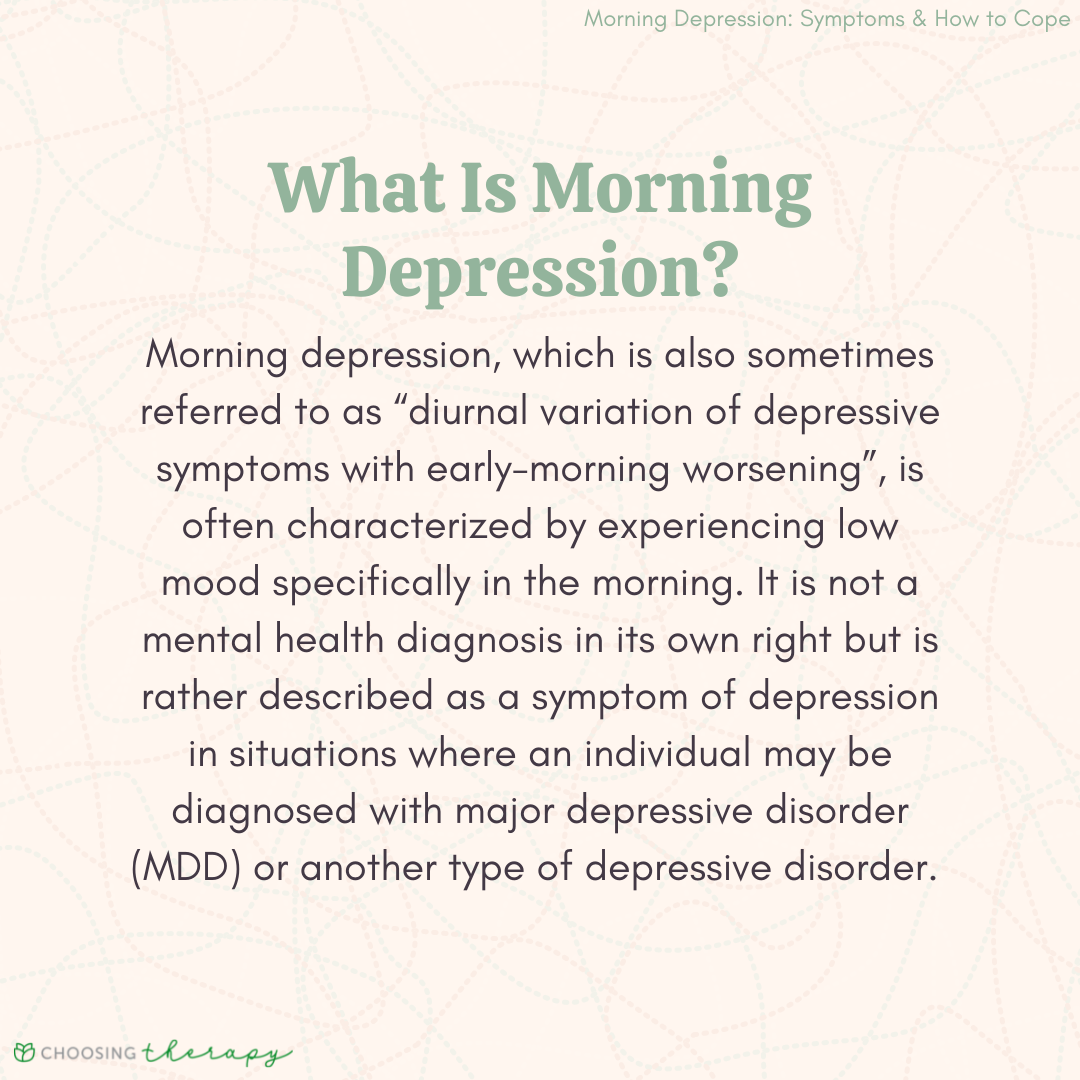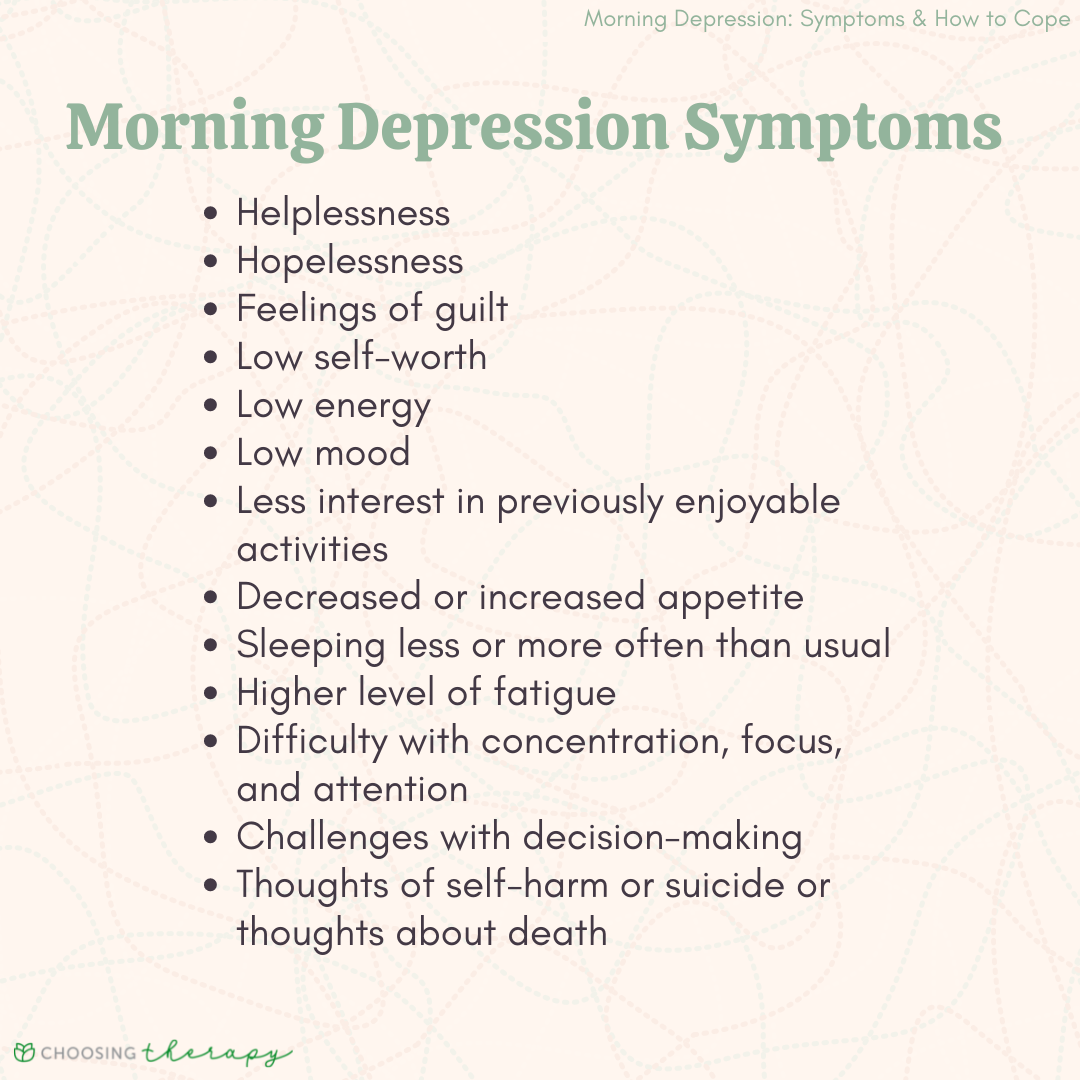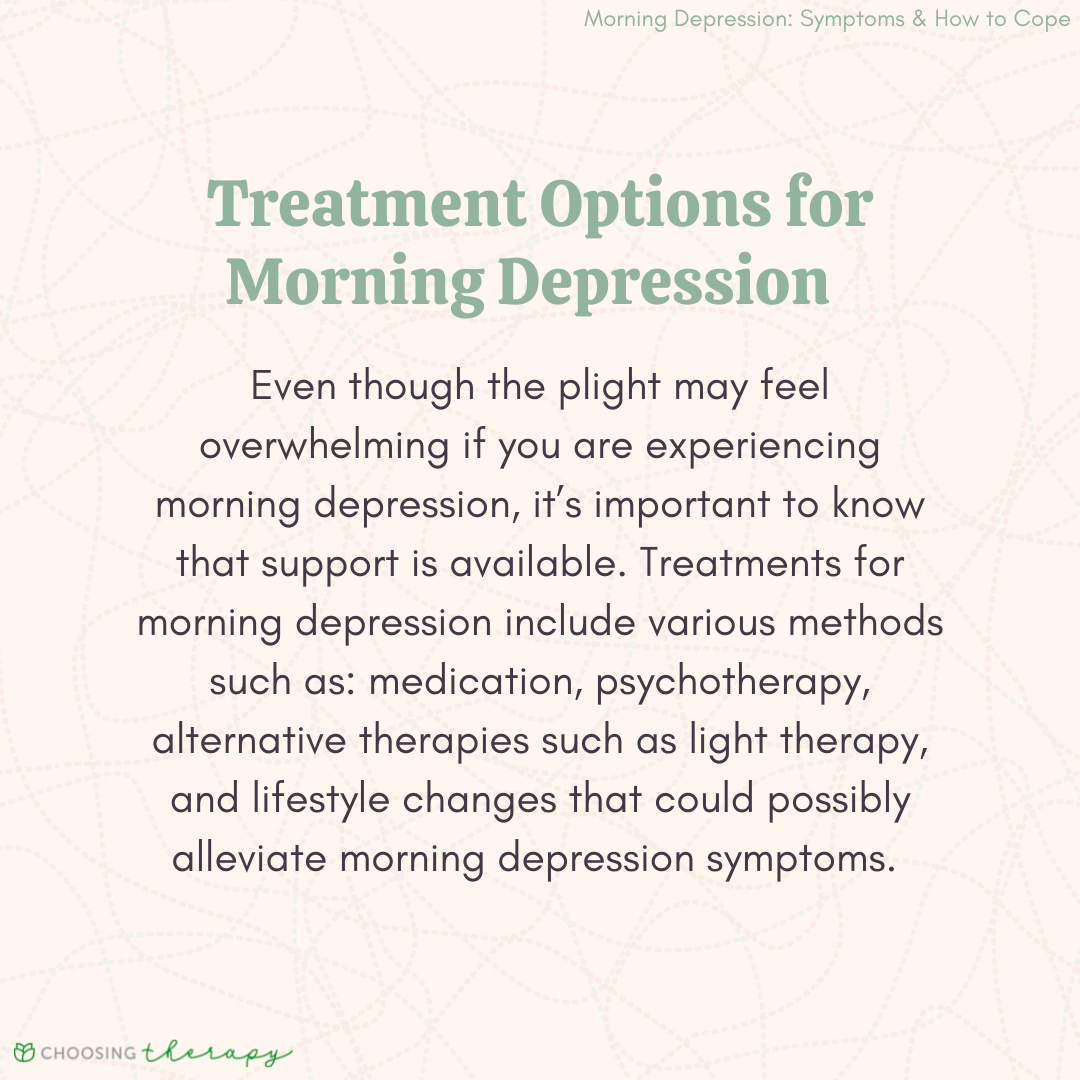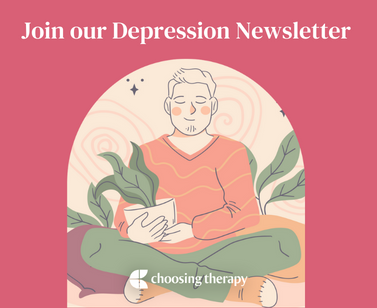Many of us find sometimes that we wake up feeling sad, unmotivated, and even a little apathetic. Morning depression occurs when an individual experiences low mood and related symptoms of depression upon waking up. More details regarding this mental health issue as well as possible options for treatment will be explored further in this article.
What Is Morning Depression?
Morning depression, which is also sometimes referred to as “diurnal variation of depressive symptoms with early-morning worsening,” is often characterized by experiencing low mood specifically in the morning.1,2 It is not a mental health diagnosis in its own right but is rather described as a symptom of depression in situations where an individual may be diagnosed with major depressive disorder (MDD) or another type of depressive disorder.
For example, morning depression appears to be commonly linked with bipolar disorder, given a late wake up time and related low mood can be symptoms of this diagnosis. Similarly, morning depression may be present even during cases where an individual is affected by one single depressive episode.2
Depression Is Treatable With Therapy
Would you like to feel more happiness and joy? BetterHelp has over 20,000 licensed therapists who provide convenient and affordable online therapy. BetterHelp starts at $65 per week. Take a Free Online Assessment and get matched with the right therapist for you.
Morning Depression Symptoms
Morning depression may impact your mood, outlook on life, and your daily functioning. Increasing your awareness and understanding of this issue is often the first step towards making positive change as you work towards getting back to enjoying the start of your day, feeling happier, connecting with others who are important to you, and being productive in your school or work life (see work depression).
Symptoms of morning depression include:1
- Helplessness
- Hopelessness
- Feelings of guilt
- Low self-worth
- Low energy
- Low mood
- Less interest in previously enjoyable activities
- Decreased or increased appetite
- Sleeping less or more often than usual
- Higher level of fatigue
- Difficulty with concentration, focus, and attention
- Challenges with decision-making
- Thoughts of self-harm or death or suicidal ideation
In addition, morning depression symptoms may include the following aspects:
- Difficulty getting out of bed in the morning
- Challenges waking up on time for work or school
- Feeling like parts of your morning self-care routine (e.g. making your bed, showering, getting dressed, making breakfast, brushing your teeth, etc.) are overwhelming
- Feeling distracted, unfocused, and unsettled in the mornings
It is important to note that morning depression symptoms have a tendency of reducing in severity and intensity as the day goes on.
Why Is Depression Worse In the Morning?
One of the potential indicators of morning depression centers around the impact of our circadian rhythm or internal clock on our mood. This line of thinking suggests that our morning depression could be tied to our circadian rhythm. Therefore, our sleep-wake cycle can negatively influence our mood.1,2
Our circadian rhythm plays a vital role not only in our sleep-wake cycle, but also in our body temperature, metabolism, hunger, and digestion.3 When our circadian rhythms are not working properly, this can contribute to mental health issues such as depressive symptoms.
This is particularly evident in night shift workers who sleep during the day and stay awake at night for their shift. This radical schedule leads them to being 40% more likely to develop depression than people who worked during daytime hours.3
Similarly, those who have depression often have sleep disturbances as they may notice that they sleep less or more than usual due to their mood issues.3 Furthermore, more severe depressive symptoms are connected with more significant problems with a person’s circadian rhythm.3
Causes of Morning Depression
There are many causes of depression and morning depression, which are both environmental and biological. Some of the causes include:
- Family history of depression
- Substance use
- Body clock
- Working night shifts
- Trauma
- History of other mental health issues
- Neurological conditions like a traumatic brain injury
- Poor coping mechanisms
- Poor social support
- Lack of structure during the day
How Is Morning Depression Diagnosed?
Morning depression is diagnosed by a psychiatrist and therapist. They will work with you over the course of several weeks to months to help determine your diagnosis. They may come up with a diagnosis of major depression and consider the ways in which your symptoms correlate to morning depression, as “morning depression” itself is not a diagnosis.
Help For Depression
BetterHelp – Get help from a licensed therapist. BetterHelp offers convenient and affordable online therapy starting at $65 per week. Free Assessment
Talkspace – Online Therapy With Or Without Insurance. Talkspace accepts many insurance plans including Optum, Cigna, and Aetna. Typical co-pay is $30, but often less. Get started
Treatment Options for Morning Depression
Even though morning depression may feel overwhelming, it’s important to know that support is available. Treatments for morning depression include various methods, such as medication, psychotherapy, alternative therapies (e.g., light therapy), and lifestyle changes that could alleviate morning depression symptoms.
There are many different ways of how to treat depression that could also be helpful for managing morning depression. Some may be psychological treatments, others may be more pharmacological. There are also alternative methods.
Therapy Options
Cognitive behavior therapy (CBT) is a traditional form of psychotherapy to treat depression and can be useful for helping someone deal with morning depression. CBT for depression can help the individual change their maladaptive thought patterns, which may have a positive influence on their mood and behavior.
If you are interested in finding ways to find a therapist, you can also explore an online therapist directory where you can search for a provider in your area who specializes in depression.
Medication For Depression
Medication for depression can also be used to treat morning depression. It is important to note that the details below are for general information purposes only and not intended to be interpreted as medical advice. If you have questions about mood medication, please consult your doctor directly.
Examples of medications that are commonly used to treat depression include:4, 5
- Selective Serotonin Reuptake Inhibitors (SSRIs) such as fluoxetine (Prozac), paroxetine (Paxil), fluvoxamine (Luvox), citalopram (Celexa), escitalopram (Lexapro), and sertraline (Zoloft)
- Selective Noradrenaline Reuptake Inhibitors (SNRIs) such as venlafaxine (Effexor), duloxetine (Cymbalta), desvenlafaxine (Pristiq), and levomilnacipran (Fetzima)
Please consult with your doctor to learn more about these medications to determine if they are suitable for you, to learn about possible side effects, and to discuss how to safely adjust the dosage if necessary.
Light Therapy
Light therapy is an alternative form of therapy to treat morning depression. It involves using artificial light that resembles daylight and it is typically used in the form of a light therapy box. It mimics natural light and, in doing so, regulates your circadian rhythm and corresponding sleep-wake cycle. In turn, this helps to stabilize your mood.
Light therapy appears to help people wake earlier, maintain their alertness and energy levels, function well during the day, and sleep better at night. Your doctor can help you develop a plan for how to use light therapy in a way that fits best with your needs.1,2,3,6
If you experience any concerning symptoms related to light therapy, such as headaches, eyestrain, or other issues, please consult your doctor and change the intensity, frequency, or duration of light therapy or how close the light box is to you as needed to relieve these side effects.
In addition, light therapy may not be recommended if you have certain pre-existing health conditions (e.g. skin condition, eye condition, bipolar disorder, etc.). Consult with your doctor to determine if it is appropriate for you based on your past medical history.6
9 Tips For How to Deal With Morning Depression
If you are trying to figure out how to deal with morning depression, consider the ideas below and try to incorporate them into your life. As you make these changes, the frequency and intensity of your morning depression symptoms may go away over time. Even choosing one tip to start with can help you begin to see positive changes and build momentum towards improvement.
Nine tips for how to cope with diurnal depression include:2
1. Speak With Your Doctor
Your doctor can assess if you have depression by asking you a range of questions about your symptoms. Your doctor may also ask if there are any other issues related to your low mood (e.g., substance use, life transitions or events, trauma, etc.). They might inquire if there is a family history of depression. They may also explore whether there are any other medical issues that could be contributing to your low mood.
If your doctor feels it could be beneficial, they may speak with you about the possibility of using mood medication to help stabilize your mood and reduce the impact of your symptoms on your family life, work responsibilities, and social/recreational activities.They may also discuss sleep medication as it could help you to become more in sync with your circadian rhythm.
2. Seek Out Therapy
You may benefit from speaking with a mental health professional about your morning depression. A therapist can help you understand your unique situation better, identify possible coping skills to help you manage your morning depression, and support you in moving forward towards your goals for improved mental health and emotional well-being.
Depression Is Treatable With Therapy Would you like to feel more happiness and joy? BetterHelp has over 20,000 licensed therapists who provide convenient and affordable online therapy. BetterHelp starts at $65 per week. Take a Free Online Assessment and get matched with the right therapist for you.
3. Connect With Your Social Network
At times when you are feeling low, reaching out to family and friends may be the last thing on your mind. However, staying connected with others in your life can help shift your mindset and mood to be more positive as it allows you to focus on something important outside of yourself and also get some much needed emotional support.
4. Get Active, Ideally Outside
Being active in terms of walking, hiking, or some other level of physical activity – ideally outdoors, if possible – is an excellent way of moving your body while also getting fresh air. Combining exercise with the outdoors increases the level of endorphins in your body. The endorphin increase and exposure to natural light can boost your mood and help reduce the severity of morning depression.
5. Avoid Substances
Sometimes to escape their emotions, people may turn to recreational drugs such as alcohol, marijuana, etc. It’s important to recognize that this will only make your symptoms worse. In fact, it may lead you to develop more health and mental health issues as a result. Do your best to minimize substance use as much as you can and find a more positive coping mechanism to use instead.
6. Focus On a Hobby That Brings You Joy & Fulfillment
Even though you may not have a great deal of motivation right now, try to channel your energy into something you enjoy or that has brought you joy in the past. Turning your attention to something fun that makes you happy may naturally lift your spirits. Try to devote even a half hour to a favorite hobby or activity and see the difference it can make for you in your day.
7. Establish a Sleep Routine
Organize yourself the night before you go to school or work by gathering your belongings, preparing your lunch, choosing what you will wear, and anything else you find helpful to do in advance in order to reduce your level of stress the next day.
Going to bed at the same time every day will help you achieve stability with your circadian rhythm and sleep-wake cycle. Prepare your mind and body for bed by doing a relaxing activity (e.g., reading a book, listening to calming music, a podcast, or an audiobook). Reduce phone, computer, and TV use if possible. Create a relaxing environment in your bedroom with lowlights, minimal clutter, and reduced distractions.
8. Create a Morning Routine
Set an alarm to get you into the habit of waking up around the same time every morning – ideally after about 7-9 hours of sleep.2 Give yourself enough time to get ready for school or work and factor in your commute time (if relevant) so you don’t feel additional stress at the beginning of the day. This will hopefully help improve your mood as you start your daily activities.
9. Eat a Healthy Breakfast
Mental health and gut health are correlated. If you start your day with a healthy breakfast, it is likely to help support your mental health, lower brain fog, and fuel you for what needs to be done that day. Healthy breakfasts packed with nutrients help you focus on your day and keep your mood stable.
Final Thoughts on Morning Depression
If you need professional help to get back on track with your sleep-wake cycle, reach out to your family doctor and try to find a therapist who can support you on your journey. Rest assured that morning depression symptoms can be managed effectively with clear and consistent routines and professional guidance and support.
Additional Resources
To help our readers take the next step in their mental health journey, Choosing Therapy has partnered with leaders in mental health and wellness. Choosing Therapy is compensated for marketing by the companies included below.
Talk Therapy
Online-Therapy.com – Get support and guidance from a licensed therapist. Online-Therapy.com provides 45 minute weekly video sessions and unlimited text messaging with your therapist for only $64/week. Get Started
Online Psychiatry
Hims / Hers If you’re living with anxiety or depression, finding the right medication match may make all the difference. Connect with a licensed healthcare provider in just 12 – 48 hours. Explore FDA-approved treatment options and get free shipping, if prescribed. No insurance required. Get Started
Depression Newsletter
A free newsletter from Choosing Therapy for those impacted by depression. Get helpful tips and the latest information. Sign Up
Learn Anti-Stress & Relaxation Techniques
Mindfulness.com – Change your life by practicing mindfulness. In a few minutes a day, you can start developing mindfulness and meditation skills. Free Trial
Choosing Therapy Directory
You can search for therapists by specialty, experience, insurance, or price, and location. Find a therapist today.
For Further Reading
Online Depression Test A few questions from Talkiatry can help you understand your symptoms and give you a recommendation for what to do next. Best Online Psychiatry Services Online psychiatry, sometimes called telepsychiatry, platforms offer medication management by phone, video, or secure messaging for a variety of mental health conditions. In some cases, online psychiatry may be more affordable than seeing an in-person provider. Mental health treatment has expanded to include many online psychiatry and therapy services. With so many choices, it can feel overwhelming to find the one that is right for you.